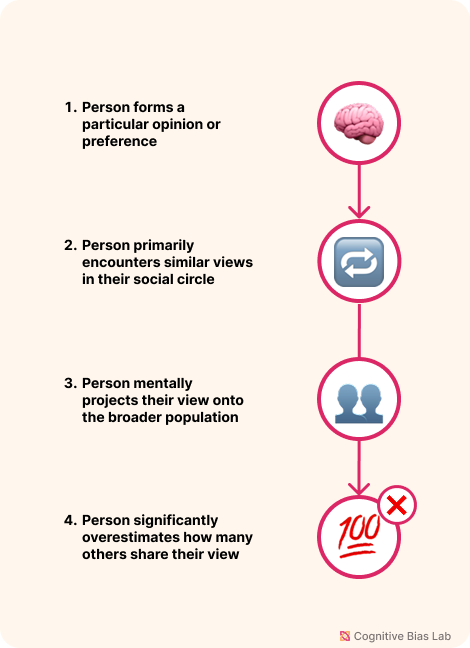False Consensus Effect
Your progress on this bias test won't be saved after you close your browser.
Understanding False Consensus Effect
False Consensus Effect
We often assume our views, preferences, and behaviors are widely shared when they're actually minority opinions. This blind spot can lead to serious missteps in business, relationships, and strategic planning.
What is the False Consensus Effect?
The false consensus effect occurs when we overestimate how common our opinions, beliefs, and behaviors are among others. This cognitive bias leads us to assume that our viewpoint represents a consensus, even when substantial evidence suggests otherwise.
Why Does This Happen?
Key Points:
- We naturally surround ourselves with like-minded individuals, creating echo chambers that reinforce our existing views.
- Our brains seek validation and prefer assuming others think like us because it's psychologically comfortable.
- Limited exposure to diverse perspectives narrows our understanding of the true distribution of opinions.
Real-World Impact
This bias has significant consequences in multiple domains:
- Strategic Planning: Teams may develop products assuming universal appeal based solely on internal enthusiasm.
- Professional Communication: Presenters might skip explaining concepts they mistakenly believe everyone already understands.
- Decision-Making: Leaders might implement policies assuming broad support without actually measuring stakeholder opinions.
By recognizing the false consensus effect, you can make more informed decisions based on actual data rather than assumed agreement, leading to strategies that account for true opinion diversity.

Visual representation of False Consensus Effect (click to enlarge)
Examples of False Consensus Effect
Here are some real-world examples that demonstrate how this bias affects our thinking:
Psychological Study Simulation
The False Consensus Effect
In this simulation, you'll explore how we tend to overestimate the commonality of our own choices and beliefs. Based on a classic 1977 study by Ross, Greene, and House at Stanford University.
The Product Development Trap
A tech startup develops a new app based entirely on the founder's personal pain points. The team, who all share similar backgrounds and preferences, becomes convinced their solution will appeal to everyone. They skip market research because "it's obviously what users want." After launch, they're shocked to discover that only a tiny subset of potential users actually share their specific problems and preferences.
The Workplace Policy Misconception
A manager believes most employees want to return to the office full-time after remote work because her immediate team expressed this preference. Without conducting a company-wide survey, she implements a mandatory return policy, citing "overwhelming support." The result is unexpected backlash from the majority of employees who preferred a hybrid model, leading to decreased morale and several resignations.
How to Overcome False Consensus Effect
Here are strategies to help you recognize and overcome this bias:
Implement Data-Driven Decision Making
Rely on surveys, analytics, and empirical feedback instead of personal beliefs. Prioritize statistically representative data before making group-related decisions.
Create Structured Devil's Advocate Processes
Assign rotating 'devil’s advocate' roles in meetings to challenge majority views. Encourage this as a standard practice to surface diverse perspectives and reduce bias.
Test Your Understanding
Challenge yourself with these questions to see how well you understand this cognitive bias:
A product manager conducts user interviews with 5 people who all express enthusiasm for a new feature. Based on this, she concludes that 80% of their 100,000 users will love it. What's happening here?
Academic References
- Ross, L., Greene, D., & House, P. (1977). The false consensus effect: An egocentric bias in social perception and attribution processes. Journal of Experimental Social Psychology, 13(3), 279-301.
- Jalbert, M., & Pillai, R. (2024). An illusory consensus effect: the mere repetition of information increases estimates that others would believe or already know it. Collabra Psychology, 10(1). https://doi.org/10.1525/collabra.124533
- Engelmann D, Strobel M. The False Consensus Effect Disappears if Representative Information and Monetary Incentives Are Given. Experimental Economics. 2000;3(3):241-260.